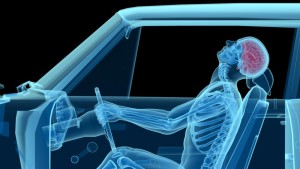10 Common Questions About Whiplash
 Whiplash is an injury to the neck. Also called neck strain or neck sprain, the condition is characterized by symptoms that occur following a car accident or an injury sustained during a fall or sport. Below are some of the most commonly asked questions about the condition.
Whiplash is an injury to the neck. Also called neck strain or neck sprain, the condition is characterized by symptoms that occur following a car accident or an injury sustained during a fall or sport. Below are some of the most commonly asked questions about the condition.
- What is whiplash?
A neck sprain or neck strain is an injury to the soft tissue and upper back. In a neck sprain/strain, the discs, ligaments, intervertebral joints, nerve roots, and cervical muscles can also become damaged.
- How do neck sprains occur?
A neck sprain or neck strain is caused by a sudden forward and/or backward jerking motion of the head. It can be as a result of a car accident, a sports injury or a fall or when you’re punched or shaken violently.
- What does a neck sprain feel like?
Symptoms of a neck sprain usually appear within 24 hours of the injury. Sometimes, they may develop after a few days. Common symptoms include neck pain, headaches, neck stiffness, decreased range of motion in the neck, fatigue, and dizziness.
- Do I need to see a doctor?
It is important to see a physician if you have any neck sprain symptoms after a collision, sports injury, fall or other traumatic injuries. Also, make sure to follow up with your doctor if moving your head is painful, the symptoms spread to your shoulders and arms or you have weakness or numbness in the arm and/or hand.
- How is a neck sprain diagnosed?
Your doctor will do a physical exam and ask questions about the event to understand the frequency and severity of the symptoms. The doctor may also order imaging tests such as CT scans, diffuse tensor imaging (DTI) and magnetic resonance imaging (MRI) to rule out other conditions that may be causing your symptoms.
- How is a neck sprain treated?
Mild to moderate cases of neck strains can be treated at home using heat, ice, gentle exercises and over-the-counter pain relievers such as ibuprofen, naproxen or acetaminophen. For severe injuries, your doctor may recommend prescription medicine, muscle relaxants, ultrasound and injection to the painful muscle area.
- Are there other ways to deal with neck sprains?
If you have ongoing pain or need assistance with exercises, your doctor may suggest physical therapy, cervical traction, massage, acupuncture, and chiropractic adjustment. Your doctor may also recommend wearing a cervical collar to hold the neck and head still.
- How long will I take to recover?
You may recover from a neck sprain within a few days, weeks or even several months to get better.
- Are there any complications associated with neck strains?
Some people with neck strains do experience headaches and chronic pain for years following an event. However, a very small percentage of people with neck sprains experience long term complications. According to the National Institute of Neurological Disorders and Stroke, most patients recover within three months after the injury.
- What can I do to help my recovery?
You can take an active role in your recovery by staying active and doing exercises. Stretching and movement exercises can help restore your neck’s range of motion and get you back to your usual activities.

